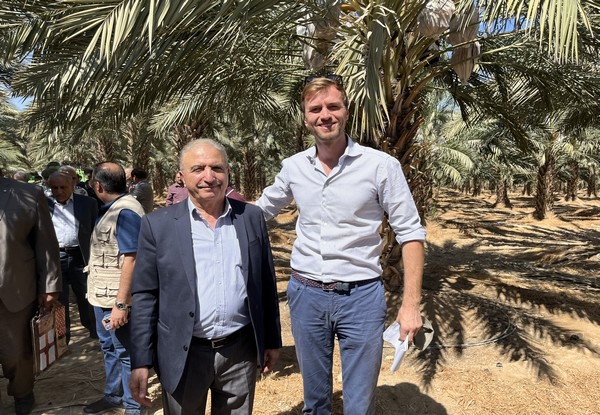The Jordanian dates sector has been revived again over the past decade, after many years of very little local production, as exports are set to increase by at least 10% this season. Due to the many young palm trees Jordan’s production of 30 000 tons and exports of dates is set to grow even more says Cedric van Oene, a project manager at Advance Consulting, a Dutch agricultural consultancy group with an office in Jordan.
“In 2021 Jordan exported around 30% of the 30 000 tons of production. Exports mainly go to Qatar, the UAE, Morocco, Lebanon and in the EU to France in particular. There will most likely be a 10% increase in production but Jordan is a small player, compared to other countries,” states van Oene.
He says in the past the Jordanian date sector’s production and local consumption was very popular. “Unfortunately locally produced dates almost completely vanished from Jordan’s menu. People imported dates from Tunisia. About 10-15 years ago local farmers saw an opportunity to plant the Medjool date variety, which is the biggest, most lucrative and tastiest.
"In early 2010, many growers started plantations in Jordan. Farmers brought in professionals to help them grow the dates because very specific knowledge is needed. There are currently two main varieties grown in Jordan, namely Al-Barhi and Medjool, which is 80% of the volume. The Jordanian date sector is currently in flux, with many plantations not in full production yet. More companies are becoming Global Gap certified in Jordan. They are addressing the standards of the higher value markets.”

(right) Cedric van Oene and (left) Eng. Anwar Haddad, Chairman of the Jordan Dates Association
Van Oene cites some facts and figures for Jordan obtained from the European Bank for Reconstruction and Development (2020).
“Currently, the cultivated area of the two varieties of "Medjool" and "Al-Barhi" in Jordan is estimated to be (35 Km2) distributed along the Jordan Valley and up to Aqaba in the far south of Jordan. The number of trees is estimated to be approximately 500,000 palm trees. Currently most farms produce 30% to 40% of the full production capacity of the trees. It is expected that the share of Jordanian production of dates will increase during the next three years as a result of many reasons including; the entry of new areas in production, the continued momentum of expansion of cultivation and production rates, and the support of the Ministry of Agriculture for these types of plants due to its high productivity per cubic meter of water compared to other fruits and vegetables.”
Advance Consulting, with offices in both Jordan and Kenya has been active in Jordan over the last 3 years. “For us, impact in emerging markets is what counts. We are there for the small- and medium-sized enterprises who are looking to grow but face all kinds of challenges. We bring together our expertise of private sector development, agri-business and access to finance, usually with the help of support programs such as those funded by the Government of the Netherlands. We always do this in a collaborative spirit, in this case together with the Ministry of Agriculture, private sector enterprises and their associations, like the Jordanian Exporters Producers Association (JEPA) and the Jordan Dates Association.
“We do a lot of work here in Jordan. The Government of the Netherlands has many projects in Jordan supporting the agricultural sector. We bring a little bit of that expertise to the sector here, for example in terms of the production or marketing of vegetables and fruits. Most importantly, we try to reduce costs, such as on water and fertilisers, because the scarcity of water and sustainability of the agricultural sector in the long term in Jordan is a big issue."
"Currently we have a great project that will train 1,500 youths over the next 3 years, with employment and other soft skills, to work in the agricultural sector. We work in the areas where the unemployment rate in Jordan is sky high among the youth, nationally at 40% but in poverty pockets like Jordan Valley even higher.
"At the same time there is not a lot of interest in the agricultural sector; something we see in other countries too. We are especially looking to train those youths with few opportunities, or who are in poverty, such as those from the Jordan Valley who are close to the farms. There are certain jobs available on the farms, but currently there is a mismatch between what Jordanian youths want and what the private sector can offer job seekers. We are kicking of our first cohort on 7 October with 25 youths, ramping up to 450 over the next 3 years. We are looking to build the Jordanian dates sector to become bigger, but in a sustainable way, building up a head of steam that has a social and economic impact that will last for many years,” states van Oene.
For more information:
Cedric van Oene
Advance Consulting
Tel: +962-796827842
Email: Cedric@advanceconsulting.nl
www.advanceconsulting.nl
